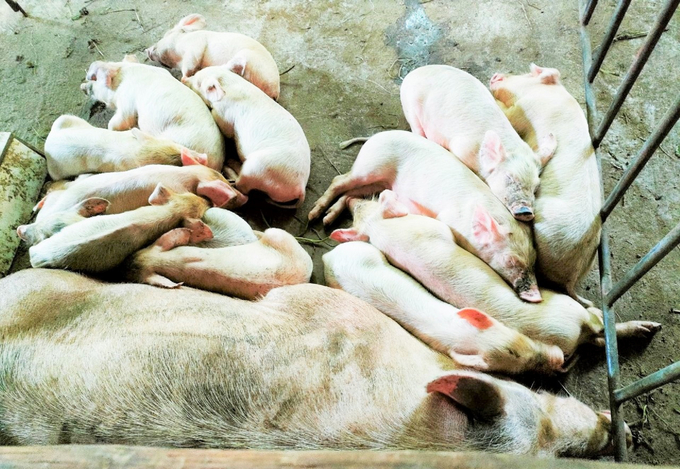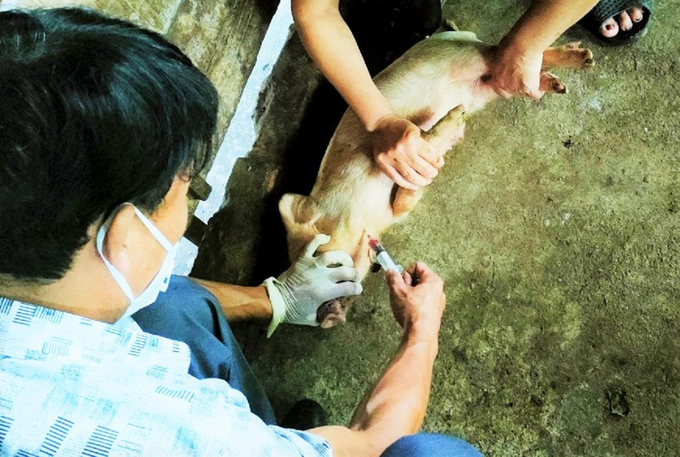November 28, 2025 | 02:54 GMT +7
November 28, 2025 | 02:54 GMT +7
Hotline: 0913.378.918
November 28, 2025 | 02:54 GMT +7
Hotline: 0913.378.918

African swine fever is currently threatening the area with the highest proportion of large-scale household pig farming in Ha Tinh province. Photo: TN.
On August 6th, Mrs. Tran Thi Binh from Na Trung hamlet, Cam Thach commune, Cam Xuyen district, discovered that 19 out of 38 pigs showed signs of not eating and subsequently died.
Immediately after, she reported to the local authorities and specialized agencies, who collected samples for testing and confirmed that the animals were affected by African swine fever (ASF). By August 15th, the disease had spread to 6 households and 4 hamlets, including Xuan Lau, Na Trung, My Thanh, and Cam Dong, affecting a total of 44 pigs.
According to Mr. Tran Van Son, Vice Chairman of the People's Committee of Cam Thach commune, following the appearance of ASF, the commune used 1 ton of lime powder and 60 liters of detoxification chemicals for disinfection in the affected households. Control measures for buying, selling, and transporting pigs within the affected area were also intensified.
"Based on our survey, households that were affected earlier had people buying and selling piglets with inquiries and negotiations. This could be a cause of the disease's spread, transmitting the pathogen from sick to healthy pigs. Additionally, the transition from prolonged hot weather to sudden autumn rains weakened the animals' immune system, making them more susceptible to disease transmission," Mr. Son remarked about the outbreak's likely causes.
Following the outbreak in Cam Thach commune, ASF also appeared in the household of Mrs. Nguyen Thi Lan in Trung Dong hamlet, Cam Duong commune, with one infected sow. All affected pigs were promptly culled in cooperation with livestock owners, and urgent measures were taken to contain and control the outbreak.
Mr. Le Ngoc Ha, Vice Chairman of the People's Committee of Cam Xuyen district, stated that due to the unique situation of having the largest population of pigs in household farming in the entire province, the prevention and control efforts faced numerous challenges in the face of this highly contagious disease.

Image of the pig herd affected by ASF from Mrs. Tran Thi Binh in Cẩm Thạch commune, Cam Xuyen district, before being taken for disposal. Photo: TN.
"We have issued documents regarding the concentrated implementation of measures to prevent and control ASF in the area. At this time, pork prices in the market are starting to rise, and people may sell sick pigs, leading to the risk of disease spread and loss of food safety if not tightly controlled. On the other hand, people are replenishing their herds, potentially bringing disease from elsewhere into the area. Therefore, disease prevention and control efforts must be concentrated and resolute. The district is intensifying inspections of transportation, slaughter, and trading activities to handle violations strictly," Mr. Ha stated.
Warning about the future development of ASF, Mr. Nguyen Hoai Nam, Deputy Head of the Division in Charge of Veterinary Management (Department of Livestock and Veterinary in Ha Tinh), emphasized that the total pig population in Ha Tinh is currently quite large (around 400,000 pigs) with a dense farming density. Hence, the risk of disease outbreaks on a household scale is very high due to people not following biosafety measures in livestock farming.
Furthermore, from the beginning of the year until now, the province has not experienced a significant ASF outbreak, leading to people having a complacent attitude. Some localities have not emphasized livestock farming and veterinary work, lacking skilled personnel. Thus, planning suitable prevention and control measures in the event of an outbreak becomes challenging.
To prevent the widespread spread of the disease, the Department of Livestock and Veterinary in Ha Tinh recommends that district and commune-level authorities enhance information dissemination and communication about the situation and development of the disease. This includes raising awareness and responsibilities among each household, livestock establishments, individuals engaged in trading and slaughter, in order to proactively implement disease prevention and control measures.

The relevant authorities organizing vaccination campaigns to enhance immunity for livestock. Photo: TN.
Guidelines for livestock farmers include implementing biosafety measures, refraining from expanding or replenishing herds without ensuring safety conditions, promptly reporting when sick or unexplained deaths of pigs occur, refraining from self-treatment and selling diseased pigs.
Appoint specialized personnel to closely monitor and guide livestock establishments, taking timely diagnostic samples, conducting tests, and handling pigs with diseases according to regulations.
Particularly, localities should ensure the progress and quality of the second round of vaccination for livestock and poultry in September 2023. They should review the list of farms and households with vaccination needs to effectively implement trial vaccination of African swine fever vaccine following guidance from the Ministry of Agriculture and Rural Development and the province's People's Committee.
Translated by Nguyen Hai Long

(VAN) According to Mr. Vo Minh Thanh, Director of the Tay Ninh Department of Agriculture and Environment, Resolution 57 has created a new development pathway for the locality, shifting from traditional toward modern agriculture.
/2025/11/26/4909-2-154329_878.jpg)
(VAN) Pearl grouper farming in HDPE cages not only delivers economic efficiency but also contributes to protecting the environment, creating jobs, and promoting marine-based experiential tourism.

(VAN) The model of making a living under the forest canopy through the agroforestry system in Van Son commune, Bac Ninh province, is expected to generate an annual income of approximately VND 30 million/ha.

(VAN) Many enterprises in Can Tho are harnessing natural energy and reducing greenhouse gas emissions in their production processes, thereby contributing to the promotion of a sustainable green transition.
/2025/11/24/3536-2-112800_176.jpg)
(VAN) Dong Nai now has tens of thousands of hectares of forests certified for sustainable management, and this area will continue to be expanded in the coming period.

(VAN) Vinh Ha hamlet (Dai Xuyen commune, Hanoi) is shifting away from small-scale farming as households adopt bioscurity into their breeder chicken models.

(VAN) Heavy rains make aquatic species more vulnerable to disease. Proactive water management and high-tech systems help farmers prevent outbreaks and protect yields.